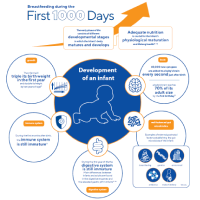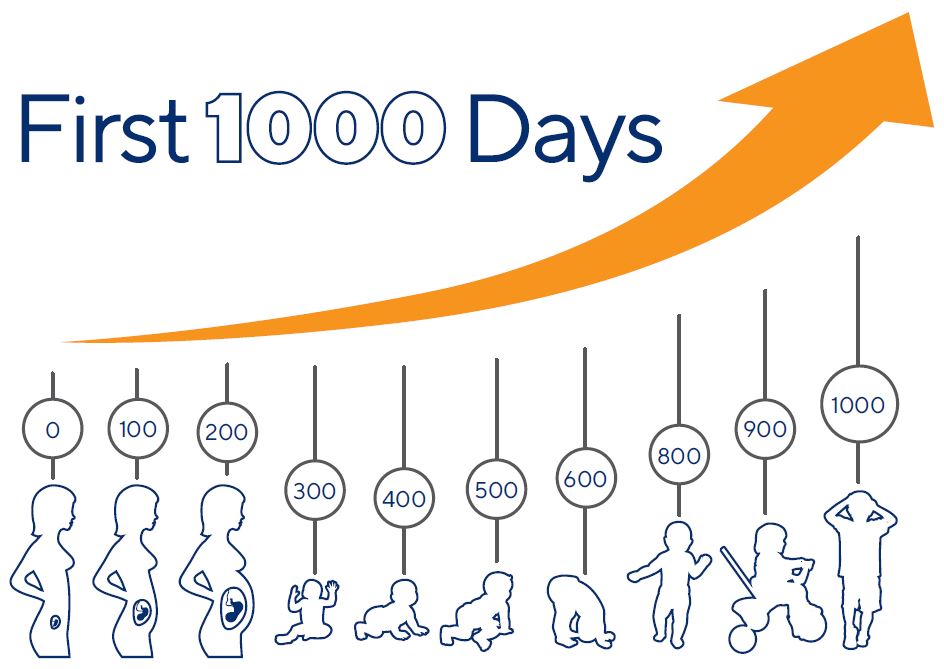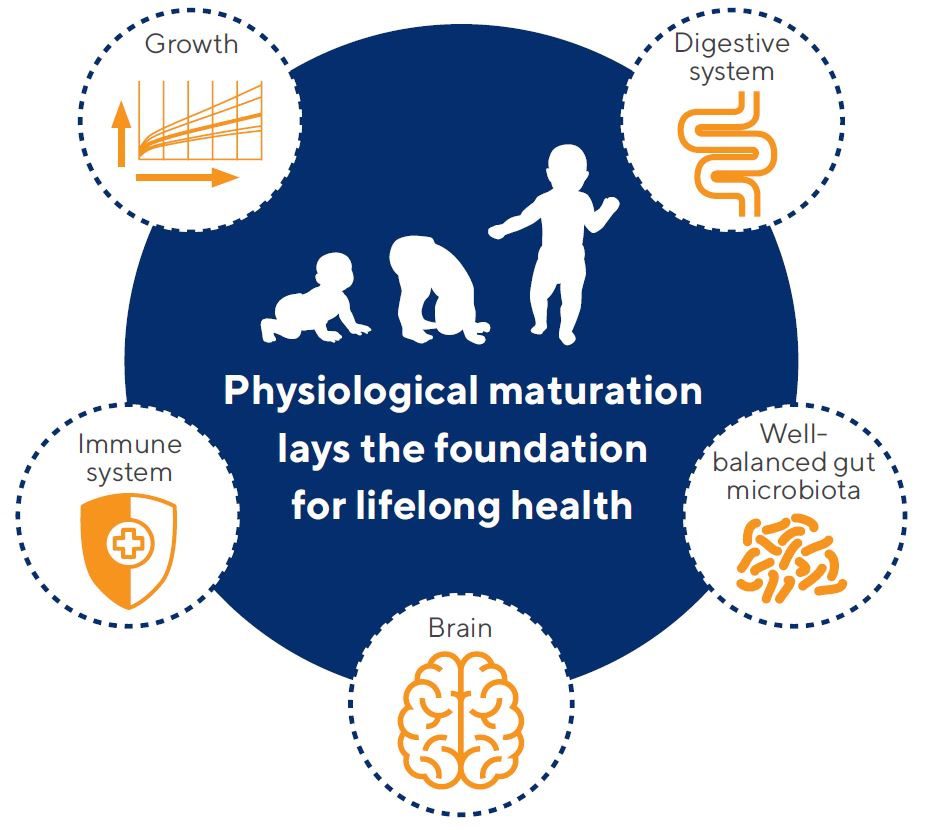
Gentle nutrition for natural growth and development of infants
The first 1000 days of an infant’s life refers to the period from conception until the child’s second birthday and is an important time for the growth and development of infants.

This early phase of life consists of different developmental stages, in which the infant’s body matures and develops. This phase is not only characterized by exponential growth of the infant’s body, but also by strong brain development. The digestive system and the immune system also undergo important maturation. The development of the gut microbiota plays a central role in the development of all these different body systems. The maturation lays the foundation for lifelong health and alterations or a delay in the maturation can have a negative impact on the long-term health outcome.1-3

The early phase of life is characterized by exponential physical growth. Body weight and length will significantly increase and the infant will triple its birth weight in the first year and double its length by two years of age.4
The development of the digestive system during the early phase of life is of major importance. The digestive system ensures digestion and absorption of nutrients but also provides a gut barrier against infectious agents and leakage of allergens.5
The immune system is relatively immature at birth and needs to learn how to defend the infant against harmful invaders and tolerate harmless allergens during early life.4, 5 An effective immune system can remove pathogens and is trained to define appropriate immune responses to harmless environmental allergens.
The brain is developing both in physical mass and in complexity: 40,000 new synapses are added every second to a baby’s brains just after birth. A baby’s brain reaches 70% of its adult size by the first birthday and 80% by the second birthday. At the age of four years, a child’s brain has reached its full size, but it won’t stop developing until approximately 20 years of age. Even then, brain development never stops.6
The maturation of the digestive and immune system depends heavily on a well-balanced gut microbiota. From the moment of birth, the infant’s gut microbiota will develop extensively. The diversity of the microbiota will gradually increase after birth due to microbes being obtained from the environment.7 The gut microbiota promotes the immune system by regulating the gut barrier function and by establishing the cells responsible for immune responses.8 The gut microbiota promotes the digestive system by providing nutrients needed for a proper development of the gut.9, 10 There is even evidence that there is an association between the gut microbiota and the brain via the gut-brain axis, so the gut microbiota might influence well-being and behaviour.11

The early phase of life is important for infants because environmental influences, such as nutrition, can have profound effects on the growth and development of the infant and thus on short-term and long-term health outcomes. Adequate nutrition is crucial for the growth and development of the infant and can help to mature the gut microbiota.
Conclusion
The early phase of life is important for infants as they grow and develop rapidly and because the digestive and immune system still need to mature. The gut microbiota gradually increases in levels and diversity and plays an important role in the maturation of the digestive and immune system. Adequate nutrition in early life is crucial for proper growth and development.
Click on the infographic below for a quick overview of the first 1000 days

References
- 1. Reilly, J.J., S. Ashworth, and J.C. Wells, Metabolisable energy consumption in the exclusively breast-fed infant aged 3–6 months from the developed world: a systematic review. Br J Nutr, 2005. 94(1): p. 56-63.
- 2. Whitaker, R.C., et al., Early adiposity rebound and the risk of adult obesity. Pediatrics, 1998. 101(3): p. E5.
- 3. Costello, E.J. and B. Maughan, Annual research review: Optimal outcomes of child and adolescent mental illness. J Child Psychol Psychiatry, 2015. 56(3): p. 324-41.
- 4. WHO, https://www.who.int/childgrowth/en/
- 5. Bischoff, S.C., ‘Gut health’: a new objective in medicine? BMC Med, 2011. 9: p. 24.
- 6. Aamodt, S. and S. Wang, Welcome to Your Child’s Brain: How the Mind Grows from Conception to College. New York, NY: Bloomsbury, 2011.
- 7. Turroni, F., et al., The infant gut microbiome as a microbial organ influencing host well-being. Ital J Pediatr, 2020. 46(1): p. 16.
- 8. Dominguez-Bello, M.G., et al., Role of the microbiome in human development. Gut, 2019. 68(6): p. 1108-1114.
- 9. Tamburini, S., et al., The microbiome in early life: implications for health outcomes. Nat Med, 2016. 22(7): p. 713-22.
- 10. Milani, C., et al., The First Microbial Colonizers of the Human Gut: Composition, Activities, and Health Implications of the Infant Gut Microbiota. Microbiol Mol Biol Rev, 2017. 81(4).
- 11. Karaivazoglou, K., et al., Neonate gut colonization: The rise of a social brain. Neurogastroenterol Motil, 2019: p. e13767.12

